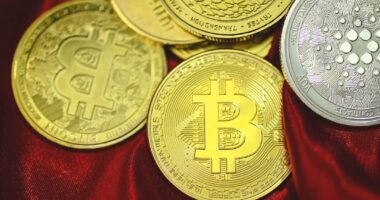The NFT market has gained significant attention in recent years, with digital assets commanding high prices and creators exploring new revenue streams. NFT, or non-fungible token, refers to a unique digital asset that cannot be exchanged on a one-to-one basis. The value of NFTs stems from their uniqueness, as they represent ownership of specific digital content such as artwork, video clips, or social media posts.
Transactions involving NFTs typically use cryptocurrency, predominantly Ethereum, and are recorded on a blockchain, which is a decentralized digital ledger. NFTs have created new opportunities for artists, musicians, and content creators to monetize their work in the digital space. By tokenizing their creations, they can sell directly to collectors without traditional intermediaries like galleries or record labels.
This has led to a more accessible art market, allowing emerging artists to gain recognition and financial success outside conventional channels. However, the NFT market is still in its early stages and can be complex, with various factors influencing the value of digital assets. It is crucial for both investors and creators to thoroughly understand the NFT market dynamics before participating.
Key Takeaways
- NFTs are digital assets that represent ownership of unique items, such as art, music, and videos, using blockchain technology.
- Research and understand the NFT market before investing, and consider factors such as rarity, demand, and the reputation of the creator.
- Be cautious of scams and frauds in the NFT market, and verify the authenticity of the NFT and the reputation of the seller before making a purchase.
- Stay informed about the legal and regulatory landscape of NFTs, including copyright laws and tax implications, to avoid legal issues.
- Consider the environmental impact of NFTs, as they can have a high carbon footprint due to the energy-intensive process of minting and trading NFTs.
Investing in NFTs: Tips and Strategies for Maximizing Profits
Conducting Thorough Research
One key tip for maximizing profits in the NFT market is to do thorough research before making any purchases. This includes understanding the artist or creator behind the NFT, the rarity and uniqueness of the digital asset, and the current trends in the market.
Long-term Potential and Utility
It’s crucial to consider the long-term potential of an NFT, rather than just focusing on short-term gains. Some investors also look for NFTs that have utility beyond just being a digital collectible, such as those that offer access to exclusive content or experiences.
Diversification and Staying Informed
Another strategy for investing in NFTs is to diversify your portfolio. Spreading your funds across different types of NFTs can help mitigate risk and maximize potential returns. This could include investing in different categories of digital assets, such as art, music, or virtual real estate, as well as purchasing NFTs at different price points. Additionally, staying informed about the latest developments in the NFT market and being aware of upcoming trends can give investors an edge in identifying valuable opportunities. By staying proactive and adaptable, investors can position themselves for success in the ever-evolving world of NFTs.
The Risks of NFT Trading: Avoiding Scams and Frauds

While the NFT market presents exciting opportunities, it also comes with its fair share of risks, including scams and frauds. One common risk in the NFT space is the potential for counterfeit or stolen digital assets. Due to the decentralized nature of blockchain technology, it can be challenging to verify the authenticity of an NFT, which opens the door for bad actors to create and sell fake tokens.
To mitigate this risk, it’s crucial for investors to thoroughly vet the legitimacy of an NFT and the reputation of the seller before making a purchase. This could involve researching the history of the digital asset, verifying the identity of the creator, and using reputable NFT marketplaces for transactions. Another risk to be mindful of is the volatility of the NFT market.
Just like with cryptocurrency, the value of NFTs can fluctuate dramatically over short periods of time, making them susceptible to speculative bubbles and crashes. This means that investors should be prepared for potential losses and not invest more than they can afford to lose. Additionally, it’s important to be wary of hype-driven investments and to approach the NFT market with a level-headed perspective.
By being cautious and diligent in their approach to NFT trading, investors can minimize their exposure to potential scams and protect their capital.
Navigating the Legal and Regulatory Landscape of NFTs
As the NFT market continues to grow, so too does the need for clear legal and regulatory frameworks to govern digital asset trading. One key legal consideration for NFTs is intellectual property rights, as creators and buyers need to understand who owns the rights to a digital asset and how those rights are transferred through an NFT transaction. This is particularly important for artists and content creators who want to ensure that their work is protected from unauthorized use or reproduction.
Additionally, there are legal implications surrounding royalties and resale rights for NFTs, as creators may be entitled to ongoing compensation when their digital assets are resold on secondary markets. From a regulatory standpoint, governments around the world are grappling with how to classify and regulate NFTs within existing financial and securities laws. This includes considerations around taxation, anti-money laundering measures, and investor protection.
As such, it’s important for participants in the NFT market to stay informed about evolving regulations and compliance requirements in their respective jurisdictions. By understanding the legal and regulatory landscape of NFTs, investors and creators can ensure that they are operating within the bounds of the law and protect themselves from potential legal disputes.
The Environmental Impact of NFTs: Ethical Considerations in Digital Profits
One often overlooked aspect of the NFT market is its environmental impact, particularly in relation to energy consumption. The process of minting and trading NFTs requires significant computational power, which in turn consumes large amounts of electricity. This has raised concerns about the carbon footprint of NFTs and their contribution to climate change.
Critics argue that the environmental cost of NFTs outweighs their cultural and economic value, especially when considering the carbon emissions associated with blockchain transactions. In response to these concerns, some artists and platforms have started exploring more sustainable alternatives for creating and trading NFTs. This includes using blockchain networks with lower energy consumption, such as proof-of-stake protocols, as well as offsetting carbon emissions through eco-friendly initiatives.
Additionally, there is growing awareness within the NFT community about the need to prioritize environmental sustainability in digital profits. By considering the ethical implications of their actions, participants in the NFT market can work towards minimizing their environmental impact and promoting responsible practices.
NFTs and Cryptocurrency: Exploring the Intersection of Eth, Btc, and Eth News

The Role of Ethereum in NFTs
NFTs are closely tied to cryptocurrency, with Ethereum (ETH) being the most widely used blockchain for creating and trading non-fungible tokens. Ethereum’s smart contract functionality enables the creation of unique digital assets and provides a secure and transparent platform for NFT transactions. As a result, ETH has become a fundamental part of the NFT ecosystem, with many investors using Ether to purchase digital collectibles and artworks.
The Impact of Bitcoin on NFTs
In addition to Ethereum, Bitcoin (BTC) has also made a significant impact on the NFT market, with high-profile sales of digital art and collectibles being conducted using BTC. While Bitcoin itself is not typically used for minting NFTs due to its limited smart contract capabilities, it remains a popular choice for storing value and making large transactions within the crypto space. Furthermore, developments in decentralized finance (DeFi) have created new opportunities for using BTC as collateral for borrowing funds to invest in NFTs.
The Future of NFTs and Cryptocurrency
As the intersection between NFTs and cryptocurrency continues to evolve, there is growing interest in exploring innovative ways to integrate different blockchain networks and digital assets. This includes cross-chain interoperability solutions that enable seamless transactions between different cryptocurrencies and NFT platforms. By staying informed about developments in ETH news, BTC trends, and emerging technologies in the crypto space, investors can gain a deeper understanding of how these factors influence the dynamics of the NFT market.
The Future of NFTs: Trends and Opportunities in the Digital Art Market
Looking ahead, the future of NFTs holds promising opportunities for artists, collectors, and investors alike. One trend that is expected to shape the digital art market is the continued expansion of virtual reality (VR) and augmented reality (AR) experiences within NFT platforms. This could open up new possibilities for immersive art exhibitions and interactive storytelling using digital collectibles.
Additionally, advancements in blockchain technology are likely to lead to improved scalability and reduced energy consumption for minting and trading NFTs. Another area of growth for NFTs is in the gaming industry, where virtual assets such as skins, weapons, and characters are increasingly being tokenized as non-fungible tokens. This has created a new market for in-game collectibles and virtual real estate, with players able to buy, sell, and trade digital assets within gaming ecosystems.
As gaming continues to move towards decentralized platforms and play-to-earn models, NFTs are expected to play a central role in shaping the future of interactive entertainment. Overall, the future of NFTs holds exciting potential for innovation and creativity across various industries. By staying attuned to emerging trends and seizing opportunities in the digital art market, participants in the NFT space can position themselves for success in this dynamic and rapidly evolving landscape.
As technology continues to advance and new applications for non-fungible tokens emerge, there is no doubt that we are witnessing a transformative shift in how we create, consume, and interact with digital assets.
FAQs
What is NFT?
NFT stands for non-fungible token, which is a digital asset that represents ownership or proof of authenticity of a unique item or piece of content using blockchain technology.
How can you make money in NFT?
You can make money in NFT by creating and selling digital art, collectibles, virtual real estate, and other unique digital assets on NFT marketplaces.
What are the risks associated with making money in NFT?
The risks associated with making money in NFT include market volatility, potential for scams and fraud, legal and copyright issues, and environmental concerns related to the energy consumption of blockchain technology.
What are some unethical practices in the NFT space?
Some unethical practices in the NFT space include plagiarism and copyright infringement, pump and dump schemes, and the exploitation of artists and creators by NFT platforms and collectors.
How can one protect themselves from the dark side of digital profits in NFT?
To protect themselves from the dark side of digital profits in NFT, individuals should conduct thorough research, seek legal advice, and carefully consider the environmental and ethical implications of their NFT activities.





